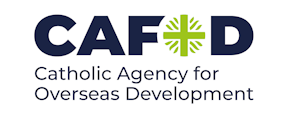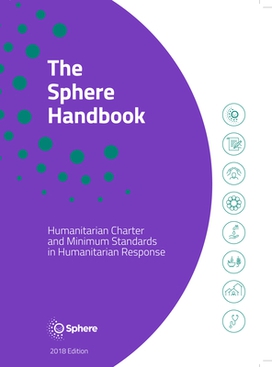
An audit is an "independent examination of financial information of any entity, whether profit oriented or not, irrespective of its size or legal form when such an examination is conducted with a view to express an opinion thereon." Auditing also attempts to ensure that the books of accounts are properly maintained by the concern as required by law. Auditors consider the propositions before them, obtain evidence, roll forward prior year working papers, and evaluate the propositions in their auditing report.

Humanitarian aid is material and logistic assistance, usually in the short-term, to people in need. Among the people in need are the homeless, refugees, and victims of natural disasters, wars, and famines. The primary objective of humanitarian aid is to save lives, alleviate suffering, and maintain human dignity.

The Catholic Agency for Overseas Development, commonly known as CAFOD, is an international development and relief charity. It is the official aid agency of the Catholic Church in England and Wales.

Islamic Relief Worldwide describes itself as "a faith-inspired humanitarian and development agency which is working to support and empower the world's most vulnerable people".

The Eco-Management and Audit Scheme (EMAS) is a voluntary environmental management instrument, which was developed in 1993 by the European Commission. It enables organizations to assess, manage and continuously improve their environmental performance. The scheme is globally applicable and open to all types of private and public organizations. In order to register with EMAS, organisations must meet the requirements of the EU EMAS-Regulation. Currently, more than 4,600 organisations and more than 7,900 sites are EMAS registered.

Medair is an international non-governmental organisation (INGO) whose purpose is to relieve human suffering in some of the world's most remote and devastated places. Medair aims to assist people affected by natural disasters and conflict to recover with dignity through the delivery of quality humanitarian aid.
The Code of Conduct for International Red Cross and Red Crescent Movement and NGOs in Disaster Relief was drawn up in 1992 by the Steering Committee for Humanitarian Response (SCHR) to set ethical standards for organizations involved in humanitarian work. In 1994, the SCHR adopted the code and made the signing of it a condition for membership in the alliance.
There are a number of meanings for the term humanitarian. Here, humanitarian pertains to the practice of saving lives and alleviating suffering. It is usually related to emergency response whether in the case of a natural disaster or a man-made disaster such as war or other armed conflict. Humanitarian principles govern the way humanitarian response is carried out.

Sphere is a global movement started in 1997 aiming to improve the quality of humanitarian assistance. The Sphere standards are the most commonly used and most widely known set of core humanitarian standards. Sphere's flagship publication is The Sphere Handbook.
The Humanitarian Response Index (HRI) is an independent civil society initiative to annually assess and rank wealthy countries against their commitment to improve the quality and effectiveness of their humanitarian assistance. Developed by DARA, the HRI's intended purpose is to assist the Organisation for Economic Co-operation and Development's Development Assistance Committee (OECD/DAC) donor governments ensure that their humanitarian assistance has the greatest impact on beneficiaries. The HRI's aim is to improve the quality and effectiveness of aid, and promote greater efficiency, effectiveness, transparency and accountability of government donors. The first edition was published in 2007, followed by subsequent editions in 2008, 2009, and 2010.

Humanitarian Accountability Partnership International, established in 2003, was the humanitarian sector's first international self-regulatory body. A multi-agency initiative working to improve the accountability of humanitarian action to people affected by disasters and other crises, HAP members ranged from organisations with a mandate for emergency relief and development activities to institutional donors. The organisation aimed to strengthen accountability towards those affected by crisis situations and to facilitate improved performance within the humanitarian sector. The ultimate goal of the organisation was to uphold the rights and the dignity of crisis-affected populations across the world.
Sexual exploitation and abuse in humanitarian response first came to public attention with the release of a report in February 2002 of a joint assessment mission examining the issue. The joint mission reported that "refugee children in Guinea, Liberia and Sierra Leone have been subjected to sexual abuse and exploitation, reportedly by employees of national and international NGOs, UNHCR and other UN bodies..." Humanitarian agencies responded almost immediately with measures designed to prevent further abuse, setting up an inter-agency task force with the objective of "strengthening and enhancing the protection and care of women and children in situations of humanitarian crisis and conflict..." In 2008 there were signs that sexual exploitation and abuse of beneficiaries not only continued, but was under-reported. In January 2010, the ECHA/ECPS task force developed a website devoted to protection from sexual exploitation and abuse (PSEA) by personnel of the United Nations (UN), non-governmental organizations (NGOs) and other international organizations.
ACT Alliance is a global alliance of more than 145 churches and related organisations from over 120 countries created to provide humanitarian aid for poor and marginalized people. 76% of its member organisations are rooted on the global south, 22% in the global north and 2% have a global presence.
People In Aid was an international, not-for-profit membership organisation with offices in the UK, Australia and East Africa. People In Aid no longer exists following its merger with HAP International on 9 June 2015 to form the CHS Alliance.
The Emergency Capacity Building Project is a collaborative capacity-building project aimed at improving the speed, effectiveness and delivery of humanitarian response programs. The ECB Project is a partnership between seven non-governmental organizations (NGOs), and implements programs in one region and four countries known as consortia.
Accountable Now is a global platform, founded in 2008 by a group of independent non-profit organisations, which is intended to foster accountability and transparency of civil society organisations (CSOs), as well as stakeholder communication and performance. It supports CSOs to be transparent, responsive to stakeholders and focused on delivering impact.
Environmental certification is a form of environmental regulation and development where a company can voluntarily choose to comply with predefined processes or objectives set forth by the certification service. Most certification services have a logo which can be applied to products certified under their standards. This is seen as a form of corporate social responsibility allowing companies to address their obligation to minimise the harmful impacts to the environment by voluntarily following a set of externally set and measured objectives.
The Core Humanitarian Standard on Quality and Accountability (CHS) sets out nine commitments for humanitarian and development actors to measure and improve the quality and effectiveness of their assistance. The CHS places communities and people affected by crisis at the centre of humanitarian action. Humanitarian organisations may use it as a voluntary code with which to align their own internal procedures. It can also be used as a basis for verification of performance.

The Sphere Handbook: Humanitarian Charter and Minimum Standards in Humanitarian Response often called the Sphere Standards is a textbook of minimum standards in humanitarian aid published by the Sphere Association.
The Minimum Standards for Child Protection in Humanitarian Action (CPMS) are guidelines developed to support humanitarian actors in delivering Child protection services during emergencies. First introduced by the Child Protection Working Group (CPWG) under the Global Protection Cluster, the CPMS aims to ensure the safety, well-being, and rights of children during humanitarian crises.








